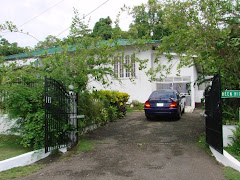Prime Jamaican Real Estate is an understatement when describing The ‘Great Houses’ of Jamaica. One of the island’s most famous and well preserved, right down to its Wedgwood china place settings is Greenwood Great House; close to the border where the parishes of Trelawny and St James, Greenwood has overlooked
the surrounding community for 211 years.
Visitors often find this 15-room tribute to Georgian architecture even more fascinating than Rose Hall, probably because it hasn’t undergone nearly as much restoration plus it has a more genteel, literary past; an altogether less “scary” history. This magnificent residence was erected between 1780 and 1800 and was home to Richard Barrett a member of the famous ‘Barretts of Wimpole Street’ no less! Richard was cousin to one of England’s renowned and best beloved poets; Elizabeth Barrett Browning whose immediate family was one of the largest landholders of that era. On display within these sturdy old walls, is the Barrett family’s original library complete with many rare books dating as far back as1697, along with portraits in oil of the family, exquisite Wedgwood china, rare musical instruments and a marvellous collection of antique furniture. In the grounds is a well-preserved glass carriage which, in its day was the Barretts’ own horse-drawn hearse. This Great House is one of if not the best, preserved and well maintained in Jamaica. Greenwood, in all its splendor, is open for tours daily and hosts functions at the property by special request. Greenwood Great House, very much alive and well and central to Jamaica’s tourist industry.
And on to yet another monument to Jamaica’s marvellous history and colonial architecture: Marlborough Great House.
Situated in Spur Tree in the parish of Manchester, Marlborough is said to have been built circa 1795 and designed by one Mr. Forsyth, a Scottish architect. The house is a finely proportioned Georgian residence with regency influences. A significant feature of the building is its high and imposing portico, which raises its large columns right up to the roof, the gutting of which is made of fine copper.
The first known owner of Marlborough House was the Honourable Richard Boucher. He was an Assembly Member of the then new Parish of Manchester and he also later became Custos of the Parish. The Bouchers are believed to have been Haitian refugees who came to Jamaica in about 1792.
This Great House boasts three bedrooms and 2 bathrooms with a well- proportioned kitchen and dining room with large storage space on the lower level. A one-bedroom cottage together with a four-bedroom cottage also sits on the property.
Leading up to the house itself is a dramatically long driveway which ends in the secluded serene picturesque grandeur of the house itself set majestically on just under 10 acres of fertile land famous for luscious fruit-bearing trees.
And, Marlborough House is currently still a private residence, very much lived in; it has certainly stood the test of time. Mr. Forsyth of Scotland certainly knew how to build a good, solid house that would last!
More Jamaican architectural treasures to come….
 |
| Greenwood Great House |
Visitors often find this 15-room tribute to Georgian architecture even more fascinating than Rose Hall, probably because it hasn’t undergone nearly as much restoration plus it has a more genteel, literary past; an altogether less “scary” history. This magnificent residence was erected between 1780 and 1800 and was home to Richard Barrett a member of the famous ‘Barretts of Wimpole Street’ no less! Richard was cousin to one of England’s renowned and best beloved poets; Elizabeth Barrett Browning whose immediate family was one of the largest landholders of that era. On display within these sturdy old walls, is the Barrett family’s original library complete with many rare books dating as far back as1697, along with portraits in oil of the family, exquisite Wedgwood china, rare musical instruments and a marvellous collection of antique furniture. In the grounds is a well-preserved glass carriage which, in its day was the Barretts’ own horse-drawn hearse. This Great House is one of if not the best, preserved and well maintained in Jamaica. Greenwood, in all its splendor, is open for tours daily and hosts functions at the property by special request. Greenwood Great House, very much alive and well and central to Jamaica’s tourist industry.
And on to yet another monument to Jamaica’s marvellous history and colonial architecture: Marlborough Great House.
 |
| Marlborough Great House |






